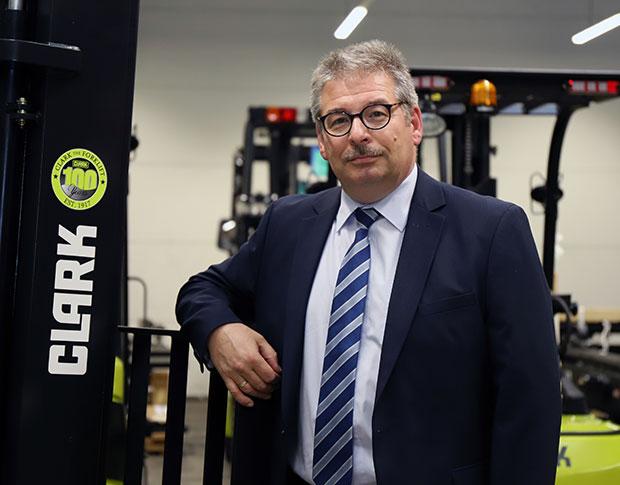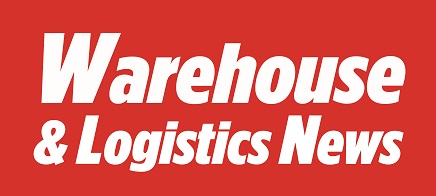Since the forklift was invented by Eugene Clark in Buchanan, Michigan (USA) in 1917, CLARK has been one of the worldwide market leaders in the materials handling vehicles business. Since 2003, CLARK has been part of the South Korean Young An Group based in Bucheon and offers a product portfolio consisting of forklifts with electric power or internal combustion engines and load capacities of 1.5 to 8 tons, narrow-aisle forklifts, warehouse equipment and an extensive range of services. CLARK Material Handling International (CMHI) with its head office in Bucheon is currently represented worldwide at more than 480 locations in over 90 nations. The operations are managed at four headquarters around the world. Clark operates production facilities in Korea, the United States, Vietnam and China. With 170 Clark dealers in 60 countries, CLARK Europe is one of four subsidiaries of CMHI and serves the regions of Europe, the Middle East and Africa from its headquarters in Duisburg, Germany.
 Rolf Eiten, President & CEO at CLARK Europe speaks to Warehouse & Logistics News.
Rolf Eiten, President & CEO at CLARK Europe speaks to Warehouse & Logistics News.
Which industry sectors are your customers in and which ones are growing fastest?
Clark supplies materials handling vehicles to customers in all industry sectors. However, the strongest growth is in the field of logistics and distribution.
What are your most recent product innovations?
Our most recent product innovation is the fact that our product range now includes electric forklifts with lithium-ion drive from 1.6 up to 5 tons load capacity. It is also possible to retrofit CLARK lithium-ion technology into trucks already in use with lead-acid technology. Even then, the battery management system of the truck communicates directly with the lithium battery. In addition, our globally popular combustion engine series, the Clark S-Series, is now available with load capacities from 2 to 5.5 tons.
What are the major trends and developments affecting your sector and your customers, and how are you responding?
We believe that manufacturers of materials handling vehicles will feel more and more cost pressure because operators want to consume and pay for as little energy as possible, but still want to achieve the highest possible availability. We expect the rental business to become even more attractive. In addition, electrification will continue to advance, which will lead to a slump in sales in the combustion engine segment in Europe, also in the higher payloads, i.e. also in 6- or 8-ton trucks. Larger vehicles, however, are heavier and thus need more energy. Inevitably, we will have to move into high-voltage technology. This affects not only the truck technology, but also the service mechanic, who must be trained and certified in the use of high-voltage technology. So, the topic of training will become increasingly important.
Can you tell us about any recent customer contracts and how you helped the customer meet their challenges?
One of the strengths of the Clark organisation worldwide is that we help our customers analyse the actual need for equipment for specific applications from a logistical point of view through detailed site analyses. Recently, we assisted a customer in determining the appropriate equipment for their forklift fleet for an entire new factory to be built in Kazakhstan.
How did business in 2022 compare to previous years? What’s your strategy for succeeding in the current climate?
Clark, globally and also for our EMEA region – Europe, Africa and Middle East division – have seen a significant increase in orders over the last two years. Our factories are struggling with the flood of orders. Like most manufacturers, of course, we are struggling with supply chain issues. But we are struggling to work through our order mountains, and the flood of orders is not abating. We are sold out well into 2023. So, we are doing well. Our strategy for success is that, on the one hand, we are increasingly equipping our product range with trucks with lithium-ion technology and, on the other hand, we have different trucks in our product portfolio for different market segments. It is clear that the requirements for a product in Africa are different from those in Europe. As far as our positioning in the market is concerned, we are getting better and better positioned and optimising our market coverage. We are not only in Europe, but worldwide with a dealer distribution network, with a few exceptions, and we are expanding it more and more. That means not only more dealers, but also more efficient dealers.
What’s the latest news from your company?
Clark is currently building up their new Global Headquarters in Dallas, Texas.
Can you tell us about any areas where you’re currently making technical advances e.g. safety, sustainability, environment?
In 2021 and 2022, Clark Europe has added lithium-ion technology as optional equipment to its complete range of CB electric forklift trucks from 1.6 to 5.0 ton capacity. Our customers now have the choice of either ordering lead-acid batteries with their Clark forklifts or they can choose forklifts with a lithium-ion battery and matching charging system. On the one hand, this gives us a high degree of flexibility and on the other hand, we help to protect the environment through lower energy consumption, save energy costs and use resources effectively.
Are you investing in staff training and skills development?
We regularly train our own employees and those of our sales partners in our training centre in Duisburg. Due to the increasing technological complexity of industrial trucks, the training of sales staff and especially of service technicians will become more and more important.
Are you taking part in any major trade shows? Can you tell us what you’ll be exhibiting there?
In 2023 we won’t participate at any major trade shows because we will have a big dealer event in our European headquarters in Duisburg.
CLARK Europe
t: +49 2065 499130





Comments are closed.